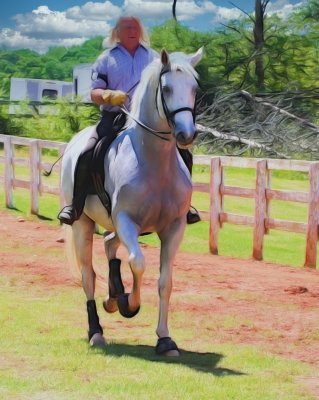The Hen with the Golden Eggs
The Hen with the Golden Eggs
Jean Luc Cornille

“Our entire biological system the brain and the heart itself work on the same frequencies.” (Nikola telsa)
The French author Jean de La Fontaine, (1621-1695), wrote a short story about a man owning a hen which dropped each day, one egg in plain gold. The man killed the hen hoping to have more gold at once. Your horse might be a golden egg. Instead of selling him for another one that you will sell for another one that you will sell for another one, until you win the lotto. It might be rational to realize that the lotto is for the ones who are very bad in mathematics. Your horse might be the gold one, which is simply submitted to very bad physics.
Riding is physics; it is about interaction of forces and subtle orchestration of muscles tendons and ligaments managing these forces. Performances and gaits are created by the sophisticated orchestration of numerous and minute contractions, compensatory contractions, stabilization, transport and other tasks, that are made possible by the plasticity of muscles functions. Tendons, ligaments, participate to the motion storing and reusing elastic strain energy. Muscles also store and reuse elastic strain energy. “Apart from the role of tendons and collagen in energy storage, the muscle itself stores and recovers elastic strain energy, as elastic strain energy can occur in the absence of tendons” (Eccentric Muscle Contractions: Their Contribution to Injury, Prevention, Rehabilitation, and Sport. Paul C. LaStayo, PT, PhD. John M. Woolf, PT, MS, ATC. Michael D. Lewek, PT. Lynn Snyde-Mackler, PT, ScD. Trugo Relch, BS. Stan L. Lindstedt, PhD. Journal of Orthopaedic & sports physical therapy. 557-571. Volume 33, NUMBER 10, October 2003) Sound locomotion is not the outcome of release, stretching and relaxation. In fact, release, stretching and relaxation are likely to be the reason why your “golden egg”, moves and perform like a “lemon.”
The whole process has to be tune to the horse’s frequency. “Because the muscle is composed of both muscle fibers and tendinous materials, all of these structures must be collectively ‘tuned’ to the spring properties for the muscle-tendon system to store and recover elastic strain energy during locomotion.” (Paul C. LaStayo and all) Driving the horse onto the bit at a cadence faster than the horse’s natural frequency might likely be another reason why a golden horse is performing like a lemon.
The rider’s actions have to be tuned to the horse frequency. Very often in clinics, I see riders with correct muscle tone, altering their dialogue with the horse due to the rapidness of their action. “Muscle force can only increase and decrease gradually, muscles cannot be either ‘on’ or ‘off’ momentarily.” (Liduin S. Meerrshoek and Anton J. van den Bogert. Mechanical Analysis of locomotion, 2003). Increase and decrease of the rider’s muscle tone has to be gradual. Sophisticated equitation demands reacting early but slowly. This level of sophistication is never addressed in usual riding and training techniques but is also another reason why a gold horse might turn into a lemon. The horse will protect himself from riders’ action that might be correct in intensity but too quick in respect of the horse natural frequency. I often see horses resisting forward movement due to excessive intensity but also the rapidness of the rider’s legs action.
Horses have a very high tactile perception in the area of their flank situated under the rider legs. The intensity of the rider legs often cause the opposite effect. The intensity of the legs pressure overload the sensitivity of the sensory preceptors and the horse shut off in order to survive. The same shutting off and consequent lack of reaction occurs when the rider legs are unstable or acting at a frequency exceeding the horse natural frequency.
Before killing the hen, wait for the daily egg. The heart of your horse might be gold but his brain has to protect his body from primitive riding and training techniques rushing the horse forward at a speed exceeding its natural frequency. Jean Luc Cornille


 twitter
twitter facebook
facebook pinterest
pinterest linkedin
linkedin